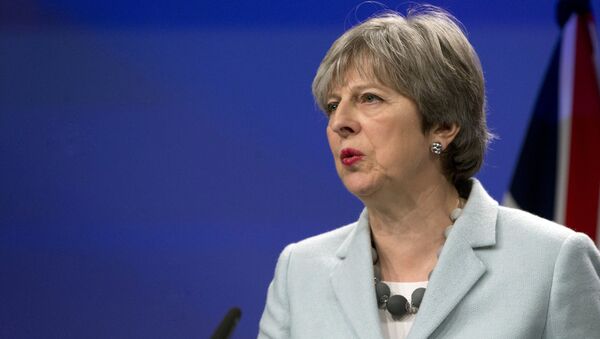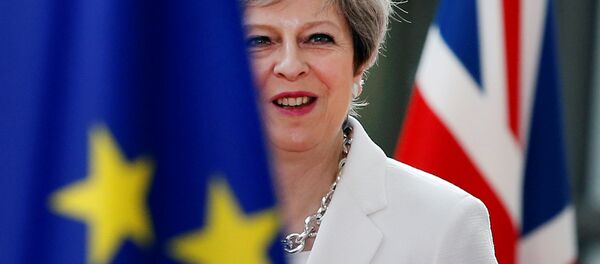After the prime minister triggered Article 50 back in March, her handling of the Phase One talks with the European Union has been put in question with the “best possible deal” in fact turning into London’s concessions on major issues. And while the talks moved on to Phase Two this December, nothing looks certain in the EU-UK agreements.
Looking back at how the Brexit negotiations spiraled this year, leading to the capitulation of Theresa May on key issue such as the Irish border and payments to the European Union, it appears the European Union deemed falling apart after the leave vote in the Brexit referendum, is back at the helm.
READ MORE: Brexit: Theresa May to Meet EU Leaders Following Staggering Parliamentary Defeat
YouGov/Eurotrack Survey poll found that only 10 percent of Brits believe London “has the upper hand in the Brexit negotiations.” Meanwhile, 67 percent of those saw the European Union dominating the talks. So for many Britons, the handling of Brexit became a laughingstock and the Christmas carols were partly replaced by jokes of ‘Brussels sprouts,’ and ‘Spanish mandarins.’
Bowing to EU Demands
The questions about whose interests Prime Minister May is serving arose after her position on Brexit started to shift toward capitulation under the pressure of the EU negotiators. The mutual accusations and apparent deadlock in the talks have always had the added pressure of the time issue, so May experienced a series of defeats – on payments to EU, the single market, the European Court of Justice etc.
“Generally, I believe the UK will have to concede masses more before a deal is concluded and that, whatever deal is eventually arrived at, will be far worse for the British people than the status quo ante,” Jolyon Howorth, Jean Monnet Professor of European Politics ad personam and Emeritus Professor of European Studies at the University of Bath told Sputnik.
Both, politicians and analysts, along with the UK population, see Prime Minister May’s capitulation as undermining her credibility and capability to get the divorce done whilst keeping UK interests intact.
“At the moment, in the aftermath of the first deal, the PM appears to take a more cooperative negotiating style. However, she needs to retain, as much as possible, the backing of key ministers in her cabinet where there appears to be a lot of disagreement on the ideal outcome. It may well prove necessary to again appear to be a ‘tough negotiator’,” Han Dorussen, Professor in the Department of Government at the University of Essex told Sputnik.
READ MORE: 'Doner Discrimination': Turkish Kebabs May Be Banned in Europe
Even If Your Cheque Paid, You Can't Leave Ongoing Party
Ever since the United Kingdom triggered Article 50, one of the main questions annoying Britons and worrying the Europeans was how much London will pay to Brussels before it leaves.
"We expect the range to be somewhere between 35 and 39 billion pounds," May's spokesman said in mid-December.
But the UK media, citing sources, widely reported that the final sum of the payments would equal 60 billion euros ($71 billion).
The UK's continued commitments to the EU budget are seen as just, since spending plans for the European Union go in cycles of seven years, so the United Kingdom will have to continue paying its share until the end of this one, meaning until the end of 2020. For the United Kingdom, the outstanding payment equates to 20 billion euros.
READ MORE: EU Brexit Negotiator Urges Theresa May to Condemn Poland During Her Warsaw Visit
Margaritis Schinas, the chief spokesperson for the European Commission, explained this in more colloquial terms when he compared the situation that the United Kingdom was ready to pay for “a round of beer” that it had ordered, during a press briefing on February 7.
“It is like going to the pub with 27 friends: You order a round of beer, but then you cannot leave while the party continues; you still need to pay for the round you ordered,” Schinas said.
Not in Power of Its Laws
One of the main Brexit goals was for Britain to get back control over its laws and jurisdiction, the lack of which it despised during its years within the European Union.
“We will not have truly left the European Union if we are not in control of our own laws,” she said, feeding the Brexit euphoria.
Similar promises have been made by other senior UK officials, yet several months later, the text of the concluding phase one of the divorce negotiations failed to deliver on any of those promises. It is not only that the European Court of Justice will have an upper hand over the UK courts in citizenship cases for another eight years after Brexit, but also there will be no British judges in the ECJ.
Negotiating the Irish Border
Throughout the year, the United Kingdom juggled between leaving the European Union and avoiding a “hard border” with Ireland, but the UK position is mutually exclusive and talks resulted in breaking the promise of leaving the EU single market.
To keep the Irish border “soft” the UK will have to “maintain full alignment with those rules of the Internal Market and the Customs Union," the text of the Brexit deal says.
“The Irish border question has not been resolved,” David Phinnemore, Professor of European Politics at Queen’s University Belfast told Sputnik, stressing that though a set of principles has been agreed, they must now be turned into firm arrangements, and it is not at all clear that that will be possible.
“The UK government is committed to withdrawing from the customs union and the single market, yet without Northern Ireland’s participation in these it is difficult, arguably impossible, to see how a hard border on the island of Ireland can be avoided. The UK government appears to be holding two mutually exclusive positions,” he said.
READ MORE: 'Soft Brexit?': Theresa May to Discuss EU Divorce with Full Cabinet
Irish lawmakers reacted mostly in a positive manner to this draft of the agreement. Irish Prime Minister Leo Varadakar hailed it as a victory for EU diplomacy, with a “bullet-proof” guarantee that there would be no hard border. DUP leader Arlene Foster was more skeptical, and although she was generally in support of the measures outlined in the draft, she said that there was room for improvement.
Han Dorussen, a Professor in the Department of Government at the University of Essex, believes that the issue of the Irish border could still rear its head during the next stage of negotiations, as the UK argues for a trade deal with the EU.
“The Irish border could well prove to be an entirely different matter because it is so closely related to the overall trade agreement that the EU and the UK are trying to agree. To keep the Ireland/Northern Ireland border indeed open, it would seem that the UK still has to make considerable concessions on aligning its future regulations as well as trade agreements with third countries to the EU,” Dorussen told Sputnik.
Phase Two Woes
After the troubles of 2017’s Phase One, the United Kingdom is now set to move into Phase Two in January 2018, largely seen as even more troubling and problematic. The question here is whether London can stop its track of concessions to Brussels.
Explaining May’s concessions Simon Usherwood, the Deputy Director of ‘The UK in a Changing Europe’ said “this in part because the UK still has not defined what it wants overall from the process of Brexit, so it is not clear what it must defend as a red line.”
On the trade issue, Han Dorussen, Professor in the Department of Government at the University of Essex believes that the EU and the UK will agree to some kind of free trade agreement, where the UK accepts to follow EU regulations and accepts limits on its freedom to negotiate deals with third countries.
READ MORE: Brexit: Theresa May to Meet EU Leaders Following Staggering Parliamentary Defeat
“Although the UK will probably no longer contribute to the main EU budget, it will continue to contribute to all kind of programmes (such as research, education, security, etc) so that at the end the financial gains for the UK from leaving the EU will be very minor,” he said.
“The eventual agreement will almost certainly come as a huge disappointment to most Brexit supporters,” Dorussen concluded.
But for now, what is needed is the stability and certainty, something essential for businesses and thus the economic prosperity. So it will be 2018 to show if ex-UKIP leader and the mastermind of UK independence, Nigel Farage is right to describe the deal made in Brussels as “good news for Mrs May as we can now move on to the next stage of humiliation.”







